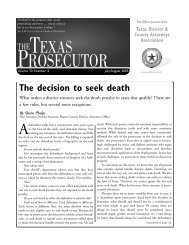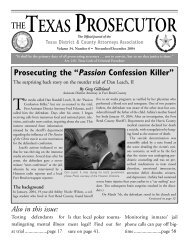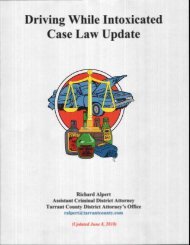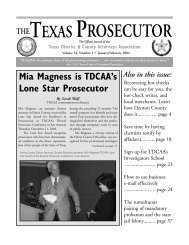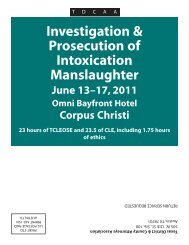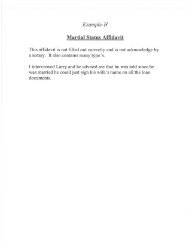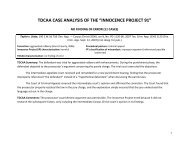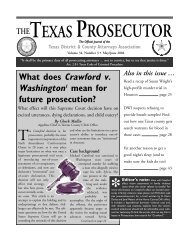Driving While Intoxicated Case Law Update - Texas District ...
Driving While Intoxicated Case Law Update - Texas District ...
Driving While Intoxicated Case Law Update - Texas District ...
You also want an ePaper? Increase the reach of your titles
YUMPU automatically turns print PDFs into web optimized ePapers that Google loves.
arrest him at the time he ansvrered the questions. Therefore, questions and answers<br />
admissible.<br />
Froh v. State, 2006 WL 1281086 (Tex.App.-Fort Worth, 2006. May 11,2006, no pet.)(Not<br />
designated for publication).<br />
After stopping the defendant for a traffic violation and smelling an odor of alcohol, the officer asked<br />
the defendant how much he had to drink and the defendant responded "at least five" beers. The<br />
officer later asked him if he was saying he was intoxicated and appellant responded,<br />
'iyes." The<br />
defendant moved fo suppress fhese sfafemenfs arguing they were the product of custodial<br />
interrogation. The Court held that he was not in custody for purposes of Miranda when he made<br />
the statements in question. Though the officer's guesfibns concerning alcohol consumption and<br />
field sobriety evaluations may indicate that appellant was under suspicion, they were nof so<br />
intrusive asto elevate the investigatory stop to a custodial interrogation. The Courtfurther pointed<br />
out that the mere existence of probable cause alone is not sufficient to trigger Miranda: other<br />
circumstances musf exrsf for a reasonable person to believe that he is under restraint to the degree<br />
assocrafed with an arrest and those circumstances were not present in this case.<br />
Hernandez v. State, 107 S.W.3d 41 (Tex.App.-San Antonio 2003, pet. ref'd).<br />
In hotding that the defendant's statement was admissibte, the Court focused on the standard that<br />
it is not what the officer thought, his subjective intent, but rather how a reasonable person in<br />
suspecf'spositionwouldsee fheissue of whetherhewasincustody. Aftersomebrief questioning<br />
and field sobriety fesfs urere pefformed, the officer formed a subjective intent to arrest the<br />
defendant but did not communicate that to him until the defendant told the officer he had consumed<br />
"nine beers" after which he was placed under arrest and handcuffed. Up to that point, the Court<br />
found that the defendant<br />
'\trould not have felt completety at the mercy of the police and would have<br />
expected to be able to proceed along his way if he passed fhe field sobriefy fesfs " For that reason,<br />
the defendant was not in custody when he made the statement and the statement was properly<br />
admitted.<br />
Lewis v. State, 72 S.W.3d704 (Tex.App.-Fort Worth 2002, pet. ref'd).<br />
Officer arrived atthescene of the accident and witness pointed out defendant as being the driver.<br />
Officer asked defendant for drivers license and insurance, noticed odor of alcoholic beverage,<br />
noticed defendant stumble. Officer asked defendant if he had anything to drink and defendant<br />
responded he had approximatelyfive beers. Court held statementswere admissible asdefendant<br />
was not in custody.<br />
State v..Stevenson, 958 S.W.2d 824 (Tex.Crim.App. 1997).<br />
Officer arrived af scene of one accident and finds defendant and his wife at the scene and asked<br />
who was driving. Both defendant and his wife sard she uras. Officer noted injuries on wife<br />
consrSfenf with her berngpassenger and repeated the question afterwhich defendant admitted he<br />
was the driver. In holding that the statement was admissible, the Court noted that defendant's<br />
52



